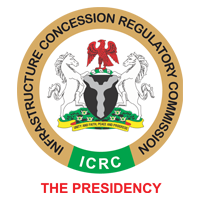
NII3P
Nigeria Institute of Infrastructure and Public-Private Partnership
The Federal Government of Nigeria in 2008 established the Infrastructure Concession Regulatory Commission (ICRC) under the Infrastructure Concession Regulatory Commission (establishment, etc) Act, 2005.
The enabling Act mandates the Commission to develop and issue guidelines on Public Private Partnership (PPP) policies, processes and procedures (including those for concessions), and to act as a national centre of expertise in PPP.
It will work closely with relevant Ministries, Departments and Agencies (MDAs) to identify potential PPP projects, build capacity within the MDAs to handle such arrangements themselves subsequently and will act as the interface with the private sector to promote communication on national policies and programmes.

The role/functions of the ICRC are derived from the mandate and include:
- Promoting, facilitating, supporting and coordinating implementation of a sound PPP process, while ensuring that principles of good governance are applied to all of the functions that form part of it;
- Providing guidelines and transaction support and building capacity in all Federal Government MDAs for project development, tendering, negotiation and contract execution;
- Developing guidelines for monitoring contract compliance during construction, operation and contract termination and supporting the MDAs assigned to this task;
- Collaborating with other agencies, including similar state-level PPP units, to implement a cohesive national legal, policy and regulatory environment that is conducive to private sector investment in Nigeria’s infrastructure projects.
The importance of the mandate that the ICRC must work closely with relevant MDAs to identify potential PPP projects, build sufficient capacity within the MDAs in order that they may handle the PPP project process arrangements themselves subsequently, led to the establishment of PPP Units in all MDAs through a Circular dated November 29th 2012 issued by the Office of Head of the Civil Service of the Federation.
The PPP Unit is expected to engender service delivery, faster execution of projects while reducing cost thereby enabling the country fast track its vision of bridging infrastructure gap in the country through PPP.
Core MBA Courses
1. Managerial Economics (4 credits)
2. Leaderships and Management in Organization (4 credits)
3. Business Statics (4 Credits)
4. Financial Management (4 Credits)
5. Managerial Accounting (4 Credits)
6. Corporate Strategy ( 4 Credits)
7. Business Law and Ethics ( 4 Credits)
8. Research Methods ( 8 Credits)
9. Project Paper
In the course of our activities over the years, the Commission has undertaken basic and intermediate PPP training for over 3,000 civil servants across the Federation – outside the one-off presentations to heads of Institutions. In Q1 of 2O20 and prior to the COVID-19 pandemic, we delivered 5 PPP capacity-building programs with average of 30 persons per session; which is about 150 people. For external PPP training - the Commission in collaboration with the World Bank facilitated the foundation PPP global certification (CP3P) for about 65 Nigerian government practitioners in the different MDAs in 2017: 32 from ICRC and 33 from other MDAs. In addition to having an MoU with the IP3 (Arlington, Washington), the Commission has sponsored so many of her staff to IP3 courses, within Nigeria and in the US. In 2018 we had a dedicated IP3 training attended by over 120 persons. Many Nigerians including ICRC staff also have attended the Australia Aid PPP program in SA and Sydney. We also hosted a training for 100 people with IP3 in 2018. In 2019, we started the Strengthening Women Participation in PPP (SWIP3) program with the support of AusAid. In 2019, in order to expand PPP experience sharing in the road sector; the Commission in association with FERMA, DBSA (South Africa), and SANRAL (South Africa) held a South Africa - Nigeria knowledge sharing workshop on road PPPs which was attended by over 200 participants and South African road concessionaires.
To institutionalize PPP capacity building, the ICRC obtained approval and incorporated the Nigeria Institute of Infrastructure and Public Private Partnership (NII3P), a non-profit organization, limited by guarantee. The Institute is the full-time capacity-building arm of the ICRC. The purpose of the Institute is to capacitate public and private sector PPP practitioners with world-class skills for developing, procuring, and implementing bankable PPPs.
The Commission intends to use the NII3P as a major vehicle for accelerating overall efforts at putting in place the requisite capacity to develop and take bankable PPP projects to market in order to rapidly close Nigeria's Infrastructure deficit. The NII3P is expected to be manned by ICRC staff and require little additional spending in the face of dwindling resources and mounting needs
In May 2020, the Commission notified the public that the NII3P has commenced operations and is expected to grow to meet our national PPP capacity-building needs in order to upscale Nigeria’s infrastructure stock. NII3P aims at being the best in Africa; and as a result, we will also gradually step into the bigger global picture, with other training, certifications, etc. In order to start up, the NII3P currently operates from the ICRC Office in Garki Abuja, with Dr. Amanze Okere as the Coordinator under the supervision of a Board of Directors chaired by the Director General. We thank and recognize the Corporate Affairs Commission, and the Federal Ministries of Justice and Education for their support and approvals.




